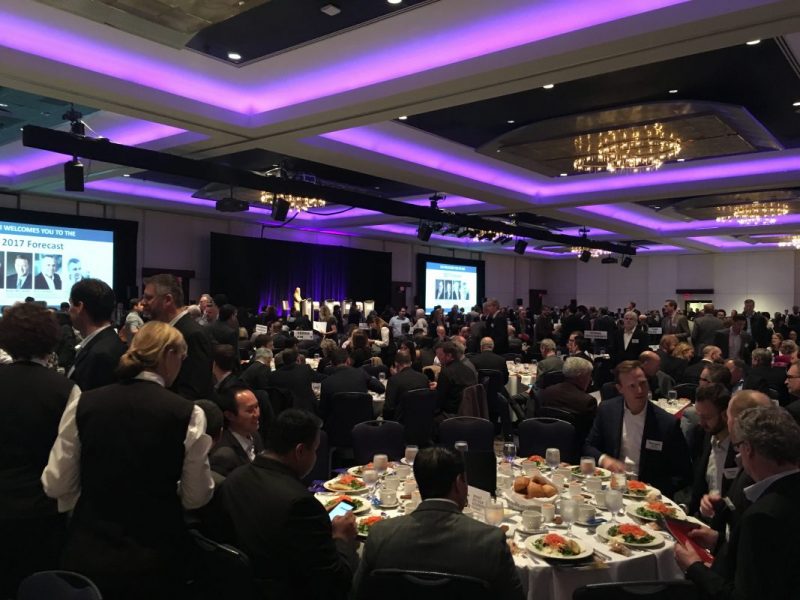Optimistic Forecast for 2017 Real Estate Market
Development experts at UDI’s much-anticipated forecast lunch optimistic for 2017.

Over 1,200 UDI members packed a Hyatt Regency ballroom to hear this year’s forecast lunch presented by UDI Vancouver. Jon Stovell, President & CEO of Reliance Properties moderated a panel of development moguls including Andrew Grant of PCI Developments, Brian McCauley of Concert Properties and the ever-entertaining Eric Carlson of Anthem Properties.
This time last year we were listening to UDI Vancouver’s panel of development experts forecast “continued, but softened growth” for the Metro Vancouver real estate market. The growth certainly continued in 2016 but it hardly softened, at least not for the first half of the year. The driving forces, outlined by last year’s experts, were underpinned by economic fundamentals: enormous demand and constrained supply.
For Eric Carlson of Anthem Properties, the fundamental market drivers remain the same for 2017 as “demand is not going away any time soon” and it continues to be difficult to get supply. Carlson maintains that Metro Vancouver is at equilibrium; there is no bubble. The permanent immigration trend (including natural regeneration) combined with the capital from baby boomers and quantitative easing holding inflation down, we’re likely to see interest rates stay low. Carlson forecasts prices will continue to rise by 10-15% for most multi-family categories. Single family homes will climb at least another 10% but homes over $2,000,000 will lag until Spring, at least, before catching back on. Carlson also anticipates rents to rise in both retail and industrial space due to a lack of supply.
Andrew Grant of PCI Developments took a more micro look at policy in Vancouver and the commercial markets. There’s a massive need for complete communities but local policy framework doesn’t encourage a combination of uses (residential, commercial, employment lands, etc.), which we know is good for jobs, public transit participation, environmental sustainability and a synergy between the uses. Current rental housing vacancy is under 0.8% and is declining due to the shortage of supply. This is not good for young workers who are mobile, well educated, well paid and less reliant on cars. The workers are changing but so is the landscape, as big tech and design tenants move to Vancouver.
Grant’s forecast for 2017 includes a continued decline in office vacancy, especially in transit oriented locations, continued downward pressure (10-25 basis points) on investment market cap rates, strong interest from foreign buyers and domestic institutions, and strength in the retail sector.
Concert Properties’ Brian McCauley’s prognostication began with a look to the past, reflecting on the volume of “noise” we’ve heard in the media this year. McCauley displayed a collection of media headlines from this past year and compared them to an eerily similar collection from publications in 2007 concluding that we do have unaffordable prices and we do have a crisis in the rental market.
Underlying the affordability challenge is a huge amount of pent up demand which we simply cannot supply product to fast enough. McCauley referenced a recent RBC affordability index which reported that it takes 92% of a Vancouver median household income to cover basic housing costs. Personal debt has reached historically high levels and 72% of first time buyers in 2016 were supported by the bank of mom and dad, up from 57% in 2015.
Rental vacancy across BC is 1.3% and 0.7% in Vancouver. Fortunately, there are a lot of new rental projects planned or under construction as developers and investors have awakened to the demand. Despite these new projects there is still a disproportionate amount of capital chasing very few rental investment opportunities. This will continue to compress cap rates. Municipalities are adding incentives, or discounts on DCCs but there are still a lot of factors working against supply. McCauley put our supply challenge in context, sharing that Seattle approved 14,000 new rental units in 2016 when Vancouver only approved 1,800. We’re starting to see noise about the Trudeau government getting involved in housing but unfortunately, we won’t see the results of that until 2018 at the earliest.
The solution, for McCauley, lies in increased land supply, alignment of the three levels of government, political will (to combat negative opposition to density that exists in many neighbourhoods) and an increase in regional transit.
These forecasts were only the opening comments from the panel of experts so be sure to check out the rest of the conversation in a video from UDI Vancouver HERE. Jon Stovell went on to hit the panel with a handful of other topical questions from politics, construction costs, rental supply and the sustainability of land prices.
